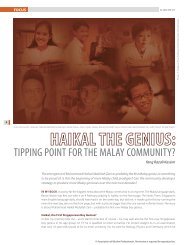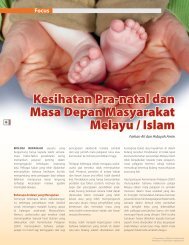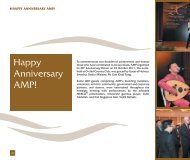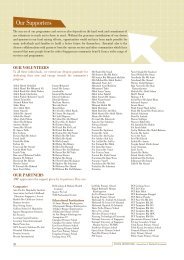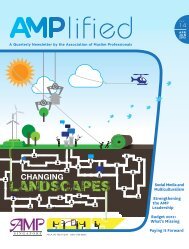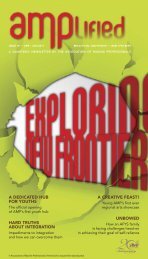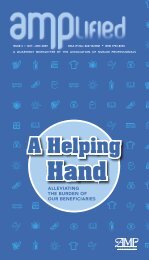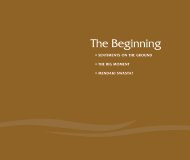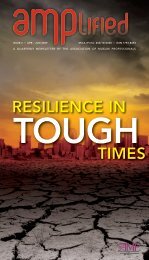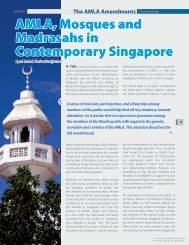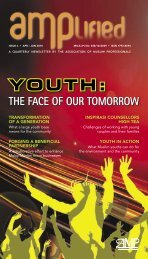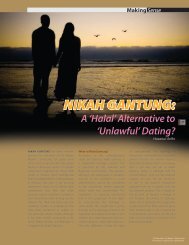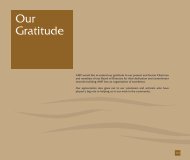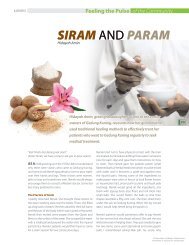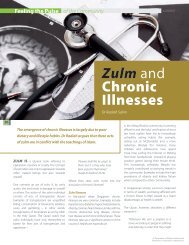community - Association of Muslim Professionals
community - Association of Muslim Professionals
community - Association of Muslim Professionals
Create successful ePaper yourself
Turn your PDF publications into a flip-book with our unique Google optimized e-Paper software.
KARYAWAN<br />
COMMUNITY<br />
IN REVIEW<br />
21 st Century Challenges<br />
To move ahead in the 21 st century, there are a set <strong>of</strong> skills and<br />
development areas that need to be developed at the school level.<br />
These skills are divided into four sets – learning and innovation<br />
skills, information media and technology literacy skills, life skills,<br />
and citizenship skills. These sets are then further subdivided into<br />
key development areas such as:<br />
LITERACY SKILLS SET<br />
LEARNING &<br />
INNOVATION<br />
INFORMATION<br />
MEDIA &<br />
TECHNOLOGY<br />
LIFE<br />
CITIZENSHIP<br />
KEY DEVELOPMENT AREAS<br />
• Critical thinking & problem<br />
• Creativity & innovation<br />
• Oral & written communications<br />
• Content mastery<br />
• Information literacy<br />
• Media literacy<br />
• ICT literacy<br />
• Flexibility & adaptability<br />
• Initiative & self-direction<br />
• Teamwork & collaboration<br />
• Social & cross-cultural skills<br />
• Productivity & accountability<br />
• Leadership & responsibility<br />
• Valuing <strong>of</strong> diversity<br />
• Global awareness<br />
• Ecological & environmental<br />
awareness<br />
• Values, Ethics & Pr<strong>of</strong>essionalism<br />
If ADE is achieved via greater diversity and choice in the educational<br />
landscape, the above mentioned skills sets are the pivots that will<br />
help the Malay/<strong>Muslim</strong> <strong>community</strong> achieve academic excellence.<br />
At present, MMOs have concentrated mainly on the first two skills<br />
sets, that is, learning and innovation and information media and<br />
technology. For the next step in achieving academic excellence,<br />
maybe we should be concentrating our resources on the life skills<br />
set which includes being flexible and adaptable, showing initiative<br />
and self-direction, having teamwork and collaboration, acquiring<br />
social and cultural skills, enhancing productivity and accountability,<br />
and achieving leadership and responsibility – or what we term as<br />
the ‘s<strong>of</strong>t skills’. This life skills set basically sets out to equip students<br />
with not only life skills, but also to give them 21 st century skills that<br />
are important ‘requirements <strong>of</strong> the future workforce’.<br />
Based on Ge<strong>of</strong>f Petty’s book on evidence-based teaching (2001),<br />
among the major influences in a child’s learning are reciprocal<br />
teaching, strategy training, peer assessment, cooperative learning<br />
and self-assessment. The details are as follows:<br />
INFLUENCE<br />
RECIPROCAL<br />
TEACHING<br />
STRATEGY<br />
TRAINING<br />
PEER<br />
ASSESSMENT<br />
COOPERATIVE<br />
LEARNING<br />
SELF-<br />
ASSESSMENT<br />
EXPLANATION<br />
Strategy to help reading comprehension<br />
for students who find this difficult. It<br />
involves them questioning, summarising,<br />
clarifying and predicting what the text<br />
will say/cover next.<br />
Explicit teaching <strong>of</strong> subject-specific<br />
and general study and thinking skills,<br />
integrated into the curriculum.<br />
Students assessing each other’s work<br />
Specific teaching methods such as jigsaw<br />
that give groups and individual students<br />
responsibility for learning, and for teaching<br />
each other relatively independently from<br />
the teacher<br />
Students assessing themselves<br />
Interestingly, one <strong>of</strong> the ‘disasters’ in terms <strong>of</strong> influencing a child’s<br />
learning is ability grouping and teacher expectation <strong>of</strong> learners.<br />
This definitely is in line with ADE, whereby the whole idea is about<br />
the child succeeding at his own pace and to the highest level<br />
possible. It is not just about the teacher and the expectations<br />
<strong>of</strong> the <strong>community</strong> or its leaders. As part <strong>of</strong> ADE, schools are to<br />
teach in a differentiated manner. Differentiated teaching takes<br />
into account three main factors, that is, students’ ability level,<br />
interest and their pr<strong>of</strong>ile. Therefore, in our quest to achieve<br />
academic excellence, we will have to study and research on our<br />
Malay/<strong>Muslim</strong> students’ pr<strong>of</strong>ile, interest and ability level. Once that<br />
is done, we can then review our approach towards empowering<br />
the students in doing better for their examinations. The approach<br />
should also be differentiated based on the earlier findings. The<br />
differentiated approach can be in the form <strong>of</strong> a different process,<br />
content and ultimately, the product.<br />
Key Challenge Facing the Community<br />
The challenge facing the Malay/<strong>Muslim</strong> <strong>community</strong> is not one<br />
<strong>of</strong> aspiration or effort, but <strong>of</strong> identifying the right initiative and<br />
intervention. We need to equip our students not only with subject<br />
knowledge, but also study and life skills that will put them in good<br />
stead for the challenges <strong>of</strong> the 21 st century.<br />
It is never about how just how good you are. It is about how good<br />
you want to be!<br />
17<br />
Aidil Subhan Mohamed is a lecturer <strong>of</strong> curriculum & pedagogy at the National Institute <strong>of</strong> Education (NIE), Nanyang Technological University (NTU).<br />
He is currently pursuing his PhD on bilingualism & language planning from the English Language & Literature Academic Group, NIE/NTU.<br />
© <strong>Association</strong> <strong>of</strong> <strong>Muslim</strong> Pr<strong>of</strong>essionals. Permission is required for reproduction.



